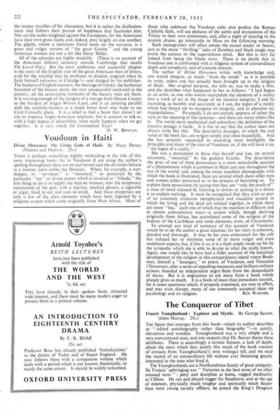Voudoun in Haiti
Divine Horsemen: The Living Gods of Haiti. By Maya Deren. (Thames and Hudson. 25s.) THERE is perhaps something slightly misleading in the title of this most interesting book; for in Voudoun (I am using the author's spelling throughout) there are no real horses and the divinities behave in a manner most unlike the Dioscuri. When, for example, a wor- shipper, or "serviteur," is "mounted," or possessed by the particular "la" or divine power which is invoked as "Ghede," the first thing to do is to supply the man or woman, now the temporary incarnation of the god, with a top-hat, smoked glasses, a cigarette or cigar, food to eat and rum to drink. And these properties are only a few of the alien elements which have been digested by a religious system which came originally from West Africa. Most of those who celebrate the "Voudoun cults also profess the Roman Catholic faith, will use pictures of the saints and invocations of the Trinity in their own Ceremonies, and, after a night of dancing to the ecstatic drums, go innocently to Mass on the following morning. Such incongruities will often amuse the casual reader or heater, Just as the more "thrilling" tales of Zombies and black magic may excite the curious or the superstitious mind. But this is very far indeed from being the vhole story. There is no doubt that in Voudoun one is confronted with a religious system of extraordinary depth and complexity and of extreme interest. The author of Divine Horsemen writes with knowledge and, one would imagine, as much "from the inside" as it is pogsible to write, unless one has actually been brought up in the religion of Haiti. Her original purpose, she tells us, was to make a film, and,she describes what happened to her as follows: "I had begun as an artist, as one who would manipulate the elements of a reality into a work of art in the image of my creative integrity; I end by recording, as humbly and accurately as I can, the logics of a reality which had forced me to recognise its integrity, and to abandon my manipulations." Personally, I do not entirely approve of either the style or the meaning of this sentence—and there are many others like it. The words seem mechanical and colourless; the definition of the creative procriks is facile. It is fair to say that the author does not always write like this. The descriptive passages, in which the real value of the book lies, are wrikten simply and often beautifully. And she has certainly succeeded in recording most intelligibly the principles and many of the rites of Voudoun, or, if she will have it so, "the logics of a reality."
She was a participant in these rites herself and was, on several occasions, "mounted" by the goddess Erzulie. The description she gives of one of these possessions is a most remarkable account of a phenomenon which is common in Haiti and rare throughout the rest of the world; and, among the many excellent photographs with which the book is illustrated, there are several which show other men and women either possessed or in the process of becoming so. To explain these possessions by saying that they are "only the result of" a state of mind induced by listening to drums or joining in a dance is to explain nothing. It must be recognised that they exist as part of an extremely elaborate metaphysical and ritualistic system in which the living and the dead are related together, in which there are many "la," each one of which may be manifest in different and in almost contradictory ways—a system which, though deriving originally from Africa, has assimilated some of the religion of the Indians of the Caribbean and some elements, even, of Christianity.
To attempt any kind of summary of this account of Voudoun would be to do the author a great injustice; for her story is coherent, detailed and thorough. It may be her own enthusiasm for the cult has induced her to minimise_ some of its more vulgar and even maleficent aspects, but, if this is so, it is a fault amply made up for by the sympathy which she is able to devote to what she really knows. Again, one would like to have had a fuller account of the historical development of the religion in this extraordinary island where Bouk- man, himself a "houngan," or priest, of Voudoun, and Toussaint I 'Ouverture, after a series of appalling massacres and brilliant,military actions, founded an independent negro State from the descendants of slaves. But it is ungracious to ask more from a book which already gives so much. It is a book of more than immediate interest, for it raises questions which, if properly examined, are sure to affect, and may even disrupt, many of our commonly accepted ideas on


































 Previous page
Previous page